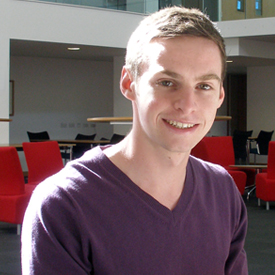
James Hill
Country Of Origin: United Kingdom
Degree: BSc Management Science, 2012
Fraud & Financial Crime Consultant, Accenture
The degree which James studied, BSc Management Science, is no longer available. It has been superseded by BSc Business Analytics and Consultancy.
I loved my Management Science degree at Lancaster because it allowed me flexibility in the modules I took, letting me follow areas of interest throughout my time at university. This meant I was able to study Mathematics alongside my major, increasing my knowledge and employability.
I chose Lancaster for many reasons, but mostly due to the social and relaxed atmosphere across campus, with the college system creating a home away from home for students. The college system created the basis of my friends, and the wide range of sports available allowed me to carry on with my two passions: golf and squash.
Because of the School’s worldwide reputation I was reassured that my choice of Lancaster would give me a platform from which to kickstart my career and life after university. It also gave me confidence that there would be high teaching standards – and together with the opportunity to study abroad and take an industrial placement this made Lancaster a firm first choice.
Through the excellent teaching of ideas that are relevant and really current, I have been able to gain a wealth of knowledge which I applied during several work experience placements and my year in industry.
Placement experience – applying techniques
Between my second and final year, I completed a year’s work placement in Reading, working for a management consultancy firm where the skills that Lancaster had helped me to develop were fully utilised. I undertook the role of analyst on a number of projects, working with UK emergency services and international clients, including Tasmania Ambulance Service and the Australian Capital Territory Emergency Services.
Over a typical project I was responsible for applying sophisticated analytical techniques to develop a comprehensive understanding of the relationship between the demands placed on services, the performance achieved and resource utilisation.
Following analysis, I would strive to improve service cost-effectiveness and inform forward planning through the use of computer models, based on OR techniques, such as optimisation and simulation. The other side of my role was to interact with the client through all stages of the project before presenting results via written reports, meetings and formal presentations to service directors.
One of the highlights was being able to manage my own project with the Northwest Ambulance Service, which allowed me to be heavily involved in both the technical analysis and modelling, along with client interactions, report writing and presentation of final results. Within the project, I had the opportunity to design, build and validate a bespoke emergency call centre simulation model which was used directly to produce final recommendations for future operational and resource planning within the service.
Enhancing skills
The placement year allowed me to implement the theories and methods I had learnt in my first two years within real-world applications. This not only increased my understanding of the theories but allowed me to see how they can be implemented in practice and the circumstances in which they are successful. Away from the academic side, my professional, client relations, communication and report writing skills were extremely enhanced, as shown in my final-year marks.
Thanks to the excellent careers advisory services on campus, I was able to practise my assessment centre skills and also learn interview techniques. With Lancaster’s help, I managed to secure a graduate job offer with the global management consultants Accenture for when I completed my final year.

